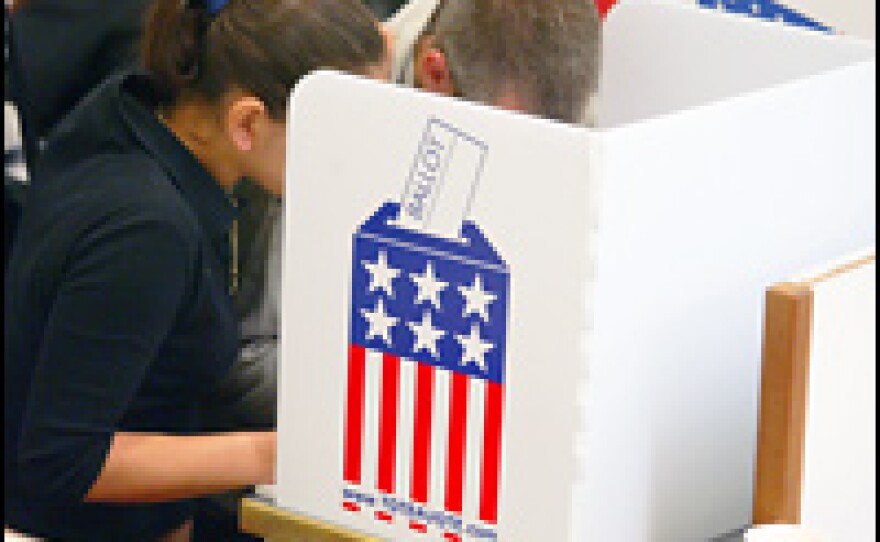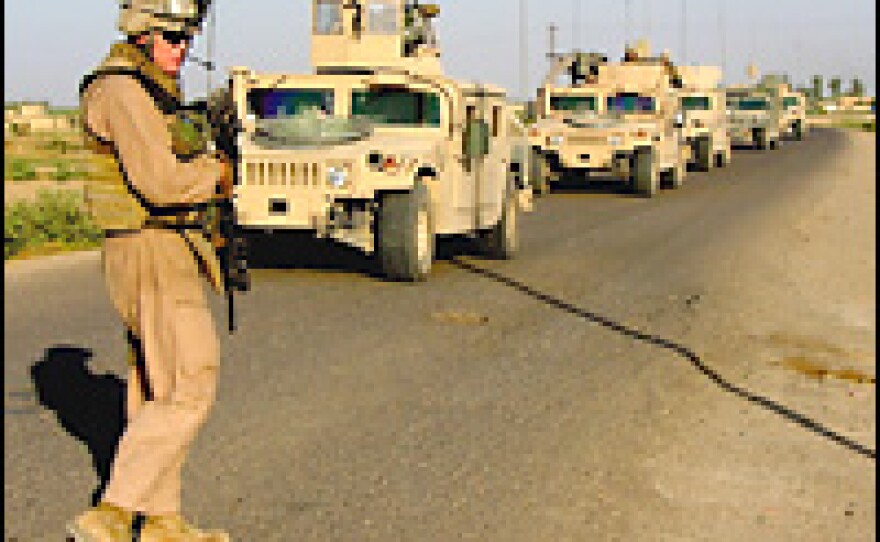
A new survey of a key voter group is yet another sign that the control of Congress is up for grabs. The survey focused on rural voters who have voted strongly Republican in recent congressional and presidential elections. But the likely rural voters surveyed are evenly split now between Republican and Democratic candidates for the U.S. House and Senate.
In the new poll, 529 likely voters were surveyed in 41 of the nation's most competitive congressional districts and in the six states with the most competitive Senate races. All of the people surveyed live in rural areas and all of the districts and states surveyed have large rural populations.
The survey was sponsored by the non-partisan Center for Rural Strategies, an advocacy group based in Kentucky. Dee Davis, the center's director, says the poll shows the importance of rural voters in the 2006 congressional elections.
"What we see right now is that rural is in play," Davis says. "If the Republicans plan to hold onto Congress, they're going to have to do better in the rural areas than they're doing now."
"Rural swing voters are going to be very competitive targets this year," says Anna Greenberg, a Democratic pollster who conducted the survey. "Right now, they are splitting their vote evenly between the Democrats and the Republicans in both Senate and House races, and there's going to be a real battle for these voters."
It's a battle that could decide who controls the House and the Senate. Rural voters have been a critical part of the Republican base because Democrats are dominant in cities and the parties split the suburbs.
"I don't think you can overstate how critical (the rural vote) is," says Bill Greener, a Republican political consultant who helped design the bipartisan poll and analyzed its results. "Rural voters have given their votes to Republicans over the years… If we do not do well among (rural voters), it's hard to see how (we can) continue to prevail."
Some of the poll's findings indicate dissatisfaction with President Bush and some of his policies. Among those surveryed, 54 percent say they voted for the president in 2004. But 56 percent say the nation is on the wrong track. Close to half disapprove of the way Bush is handling his job. Forty-two percent say Democrats care more about issues of concern to rural Americans. More than 60 percent agree with the statement, "The economy has improved mostly for the wealthy." And more than half agreed that the nation "needs to have a responsible plan to get our troops home by next year."
The war in Iraq is an issue that resonates with rural voters. Seventy-three percent of the survey respondents report they have family, friends or acquaintances who have served or are serving in Iraq and Afghanistan. There's evidence that the military has a disproportionate number of troops from rural areas, and rural troops are dying at a disproportionate rate, according to an analysis of Pentagon statistics.
"For a lot of Americans, there's a distance from the war," says Dee Davis of the Center for Rural Strategies. "They don't know the people fighting... It's not real in the sense that their community's going to change because of what happens in that war."
Davis suggests the war is more intimate for many rural Americans.
"The death rates from rural communities are about twice as high as they are from the largest communities. So those of us in rural areas have a real community knowledge of what war means, what the price is, what the sacrifices are."
Elgin, Ariz., is so rural that Jacqueline Wimberly, 72, drives a mile-and-a-half to get her mail. But the wars in Iraq and Afghanistan are never far from her mind. She has a great-grandson who served in Iraq and is training for duty in Afghanistan.
"Going into Iraq with the wrong information ... I think we acted too fast ... too aggressively," Wimberly says. That has her considering a vote for a Democrat, something she says she's never done before.
Across the country in rural Putnam County, Ohio, retired nurse Jan Schimmoller says she's leaning Republican. But she's open to change, she says, due to a poor economy and low wages.
"My daughter is 40 and she's single. And it's like you're either very wealthy or you're going down with the ship, as she says, because it is very hard to get anywhere unless you make a lot more than most people are making."
Most of the nation's poorest counties are rural, and rural places have lost thousands of manufacturing jobs. The economy and the war give Democrats an opportunity to cut Republican rural strength. But the survey also gives Republicans reasons for confidence, says political consultant Bill Greener.
"Republicans have an advantage in these areas, according to the survey, when the discussion focuses on security," Greener says. "I think there's a countervailing pressure when you put into place the security issue and how people feel about that."
Security is the biggest election year issue for 39-year-old Sherman Crum, a bank controller in Caldwell, Ohio, who isn't sure how he'll vote in the Senate and congressional races there. But he's the kind of rural swing voter Republicans could target with a security message.
"One of the most basic duties of the federal government is to secure our country," Crum says. "If they can't keep track of who's coming through the border down there by Mexico and we can't keep track of who is flying in and out of our airports, we put ourselves at grave risk."
Moral values could also resonate with many rural voters, given the results of the 2004 presidential campaign. Republicans focused on moral values in key rural states, most notably Ohio, and their "moral rural" strategy is credited with giving the president his winning margin.
When it comes to values, "rural Americans are more comfortable with the Republican position on a whole host of those kinds of topics," says Republican political consultant Bill Greener. Those could include gay marriage, abortion and the role of religion in public life. They're what undecided voter Dave Kohl is thinking about as he considers his congressional and Senate choices. Kohl is a factory worker in Chillicothe, Ohio. "Y'know, I would rather not vote at all than vote for somebody who did not share my values," Kohl says. "I just want somebody who shares my Christian values."
With more than six weeks of intense campaigning ahead, there's plenty of time for candidates from both parties to appeal to the rural voters who have yet to commit. There's plenty of opportunity for voters to shift as candidates become more familiar. In fact, two years ago a similar poll of rural voters also conducted in late September showed an even split. That transformed into a wide Republican majority by election day.
The Center for Rural Strategies plans one more poll before the election to track any shifts in the rural electorate.
Copyright 2022 NPR. To see more, visit https://www.npr.org. 9(MDAzMjM2NDYzMDEyMzc1Njk5NjAxNzY3OQ001))







